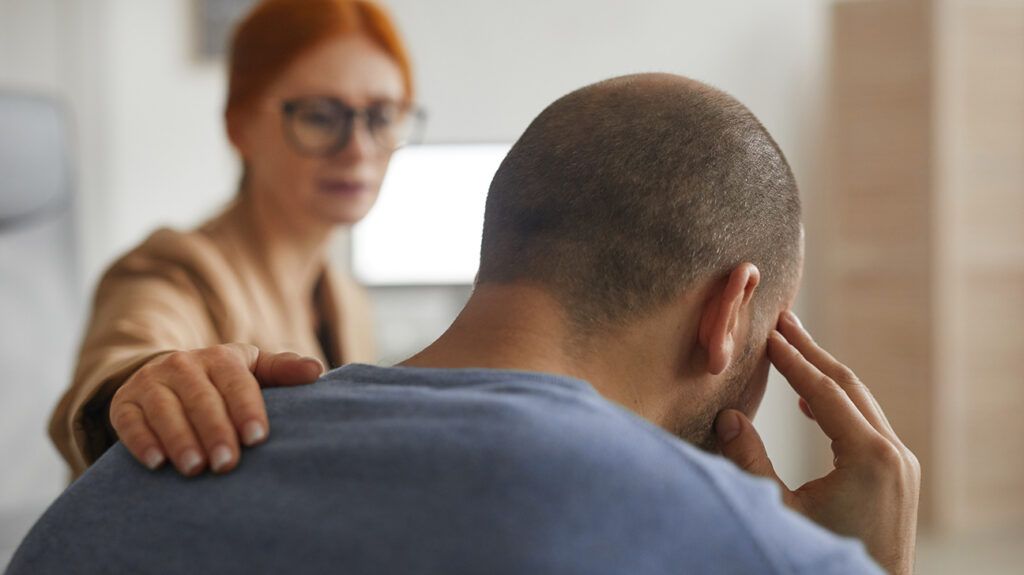Developing a connection with your therapist is part of the process. But is it ever OK for you to hug them?

If you’ve been in therapy for a period of time and feel like it’s going well, you may want support from your therapist in the form of a hug. After all, the process of therapy can be very intimate and emotional.
But can a therapist touch a client? Will physical contact get them in some kind of trouble?
A therapist can hug a client if they think it may be productive to the treatment. A therapist initiating a hug in therapy depends on your therapist’s ethics, values, and assessment of whether an individual client feels it will help them.
If you ask for a hug in therapy, your therapist has to consider various factors about your treatment. These factors can include:
- your personality
- your present mental health state
- your past-trauma triggers
- their own individual characteristics
Ethics in psychotherapy
Ethics are an important consideration before hugs are used in therapy. Your therapist may have to consider a variety of factors before deciding to hug you.
This may be dependent on factors such as:
- gender
- diagnosis
- presenting issues
- trauma history
- your therapist’s theoretical orientation
- cultural background
Some therapists might first ask themselves: “Would I do this if I was outside the therapy room, surrounded by other clients or professionals?”
When a hug might be good
None of the ethics boards that regulate mental health professionals specifically prohibit the use of touch or view it as unethical.
There are times when your therapist may believe that it’s more harmful to you not to initiate a hug. In some cases, nonsexual, therapeutic touch may be beneficial.
When a hug might be problematic
Therapists may decline a hug from a client if they think you might misinterpret the hug or have irrational ideas or delusions about the nature of your therapeutic relationship.
For example, some folks may develop feelings for their therapists and fantasize about being in a relationship with them, or have false hope that the therapeutic relationship will develop into something more. In this case, a hug would not be appropriate.
Your therapist should not engage in any kind of sexual contact with you. This is very unethical.
A 2020 research article exploring the use of therapeutic touch suggests that clinicians consider the clients’ cultural background, personal touch history, and current state to ensure therapeutic touch will not cause harm.
Your therapist is not your friend. Your therapist can’t become your romantic or sexual partner, either.
It’s important to realize that any kind of violent, sexual, or aggressive touch by your therapist is always unethical and has the potential to cause long-term harm.
A good therapist should never make you feel uncomfortable.
If you believe you’re safe and comfortable with a hug from your therapist, it doesn’t hurt to ask for one. Of course, your therapist has a right to say no.
There are other ethical considerations a therapist has to make regarding touch. For example, some therapists may pat you on the back to signal support or shake your hand to introduce themselves.
In some forms of therapy, such as eye movement desensitization reprocessing therapy (EMDR), therapists may tap you on the hands or legs for bilateral stimulation of the brain.
The therapist’s cultural or religious background may also determine what the therapist is OK with regarding boundaries.
You may ask, “Can I call you between sessions?” A good therapist has rules or policies regarding contact between sessions that outline if this is alright. If you don’t know your therapist’s policy regarding contact outside of sessions, it may not hurt to ask.
Hugs may be acceptable in therapy, and sometimes they aren’t. This is all dependent on various factors in the therapeutic relationship and individual characteristics of you and your therapist.
Remember, your relationship with your clinician can be close — but it should remain a professional one. If it’s not, it can cause you harm and professional repercussions for your therapist.
Hugs might be beneficial to your treatment, but if you’re not sure, you can always ask your therapist. A qualified therapist will assess when hugs are appropriate and when they are not.
